The Role of the Manager: Skills, Analysis, Reflection and Conclusion
VerifiedAdded on 2020/01/28
|15
|2537
|284
Report
AI Summary
This report delves into the critical role of a manager within an organization, examining various facets that contribute to effective leadership and organizational success. The report begins with an abstract highlighting the significance of managerial roles, followed by a detailed literature review of the Managerial Escalator concept, and the systems theory of management. The analysis section presents insights from interviews with managers from HSBC and BT Group, exploring their decision-making processes, challenges in transitioning to management roles, and perspectives on measuring success. A reflection section follows, drawing conclusions from the interviews and literature, and emphasizing the need for adaptability, efficient work practices, and skill development. The report concludes with a summary of the key findings, stressing the importance of skills, personality, and efficient work processes for managerial success, and how these elements contribute to company growth. Appendices include a diagram of the system theory and the interview questionnaires.
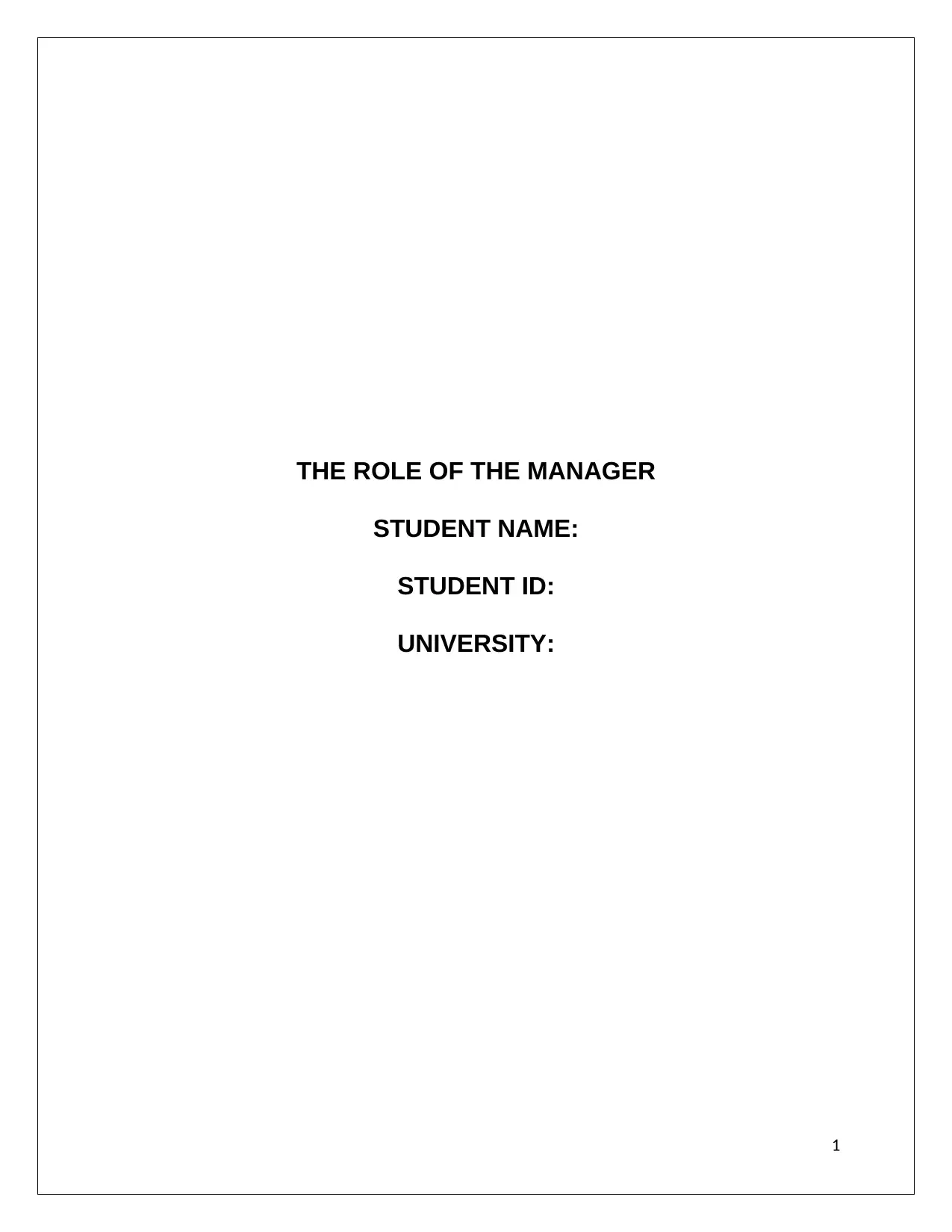
THE ROLE OF THE MANAGER
STUDENT NAME:
STUDENT ID:
UNIVERSITY:
1
STUDENT NAME:
STUDENT ID:
UNIVERSITY:
1
Paraphrase This Document
Need a fresh take? Get an instant paraphrase of this document with our AI Paraphraser
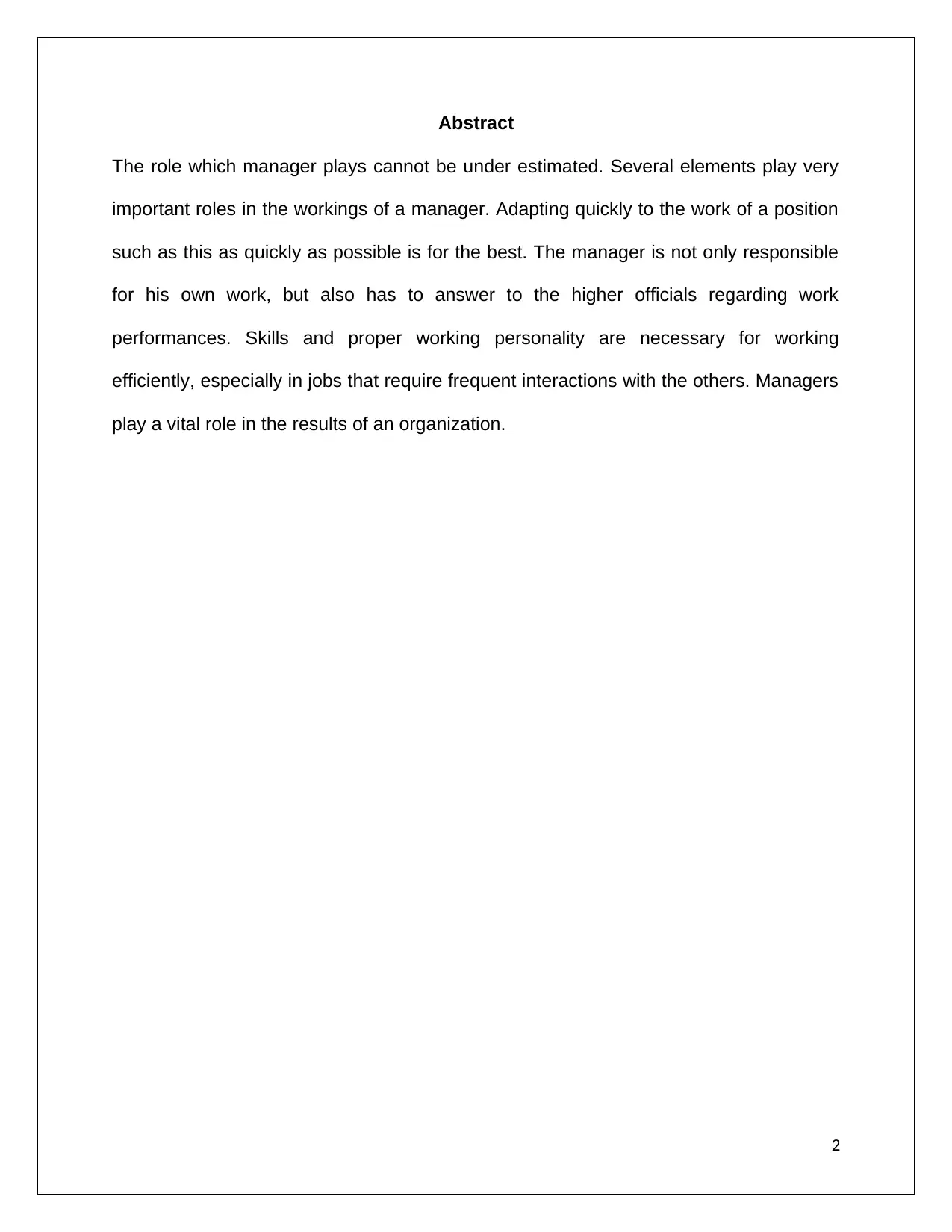
Abstract
The role which manager plays cannot be under estimated. Several elements play very
important roles in the workings of a manager. Adapting quickly to the work of a position
such as this as quickly as possible is for the best. The manager is not only responsible
for his own work, but also has to answer to the higher officials regarding work
performances. Skills and proper working personality are necessary for working
efficiently, especially in jobs that require frequent interactions with the others. Managers
play a vital role in the results of an organization.
2
The role which manager plays cannot be under estimated. Several elements play very
important roles in the workings of a manager. Adapting quickly to the work of a position
such as this as quickly as possible is for the best. The manager is not only responsible
for his own work, but also has to answer to the higher officials regarding work
performances. Skills and proper working personality are necessary for working
efficiently, especially in jobs that require frequent interactions with the others. Managers
play a vital role in the results of an organization.
2
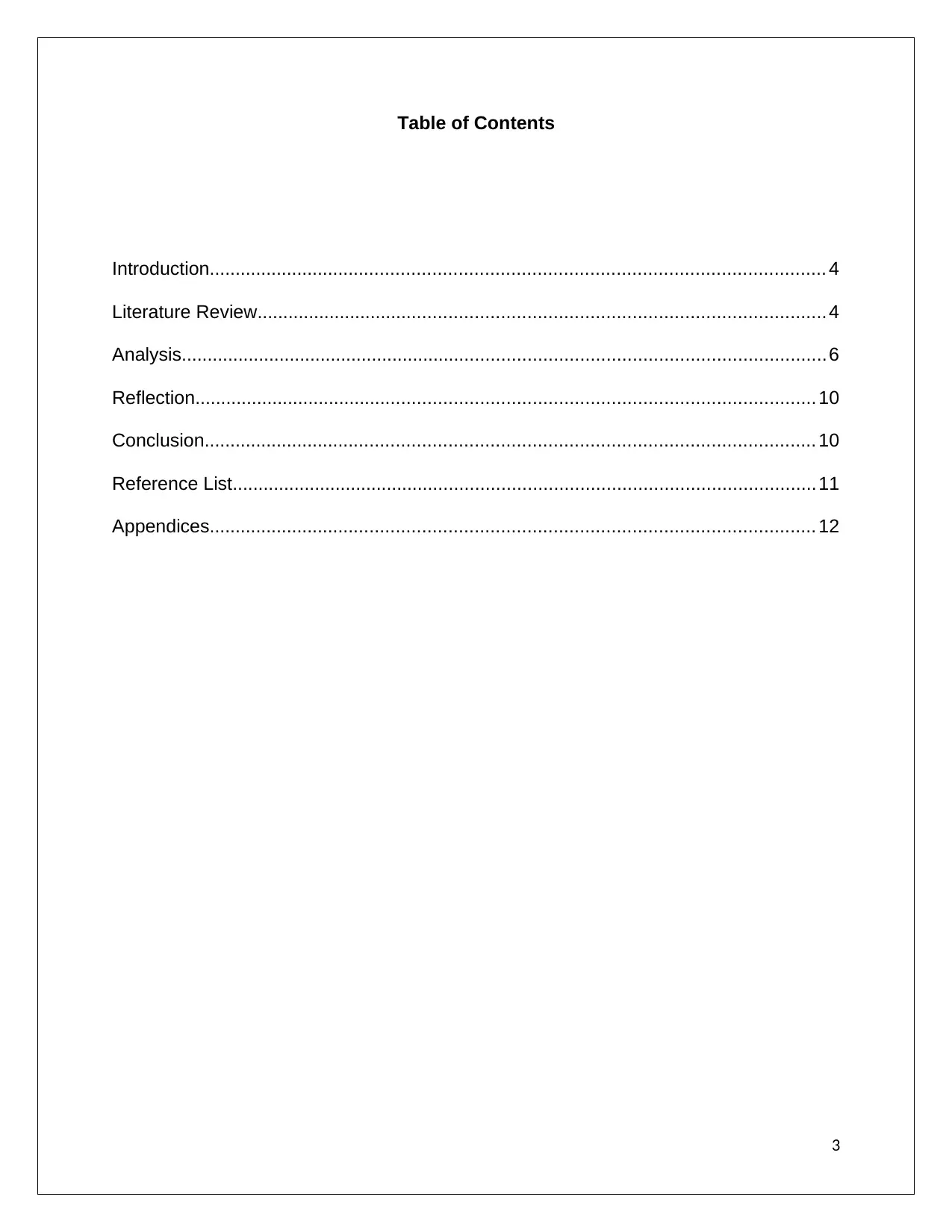
Table of Contents
Introduction...................................................................................................................... 4
Literature Review............................................................................................................. 4
Analysis............................................................................................................................6
Reflection....................................................................................................................... 10
Conclusion..................................................................................................................... 10
Reference List................................................................................................................ 11
Appendices.................................................................................................................... 12
3
Introduction...................................................................................................................... 4
Literature Review............................................................................................................. 4
Analysis............................................................................................................................6
Reflection....................................................................................................................... 10
Conclusion..................................................................................................................... 10
Reference List................................................................................................................ 11
Appendices.................................................................................................................... 12
3
⊘ This is a preview!⊘
Do you want full access?
Subscribe today to unlock all pages.

Trusted by 1+ million students worldwide
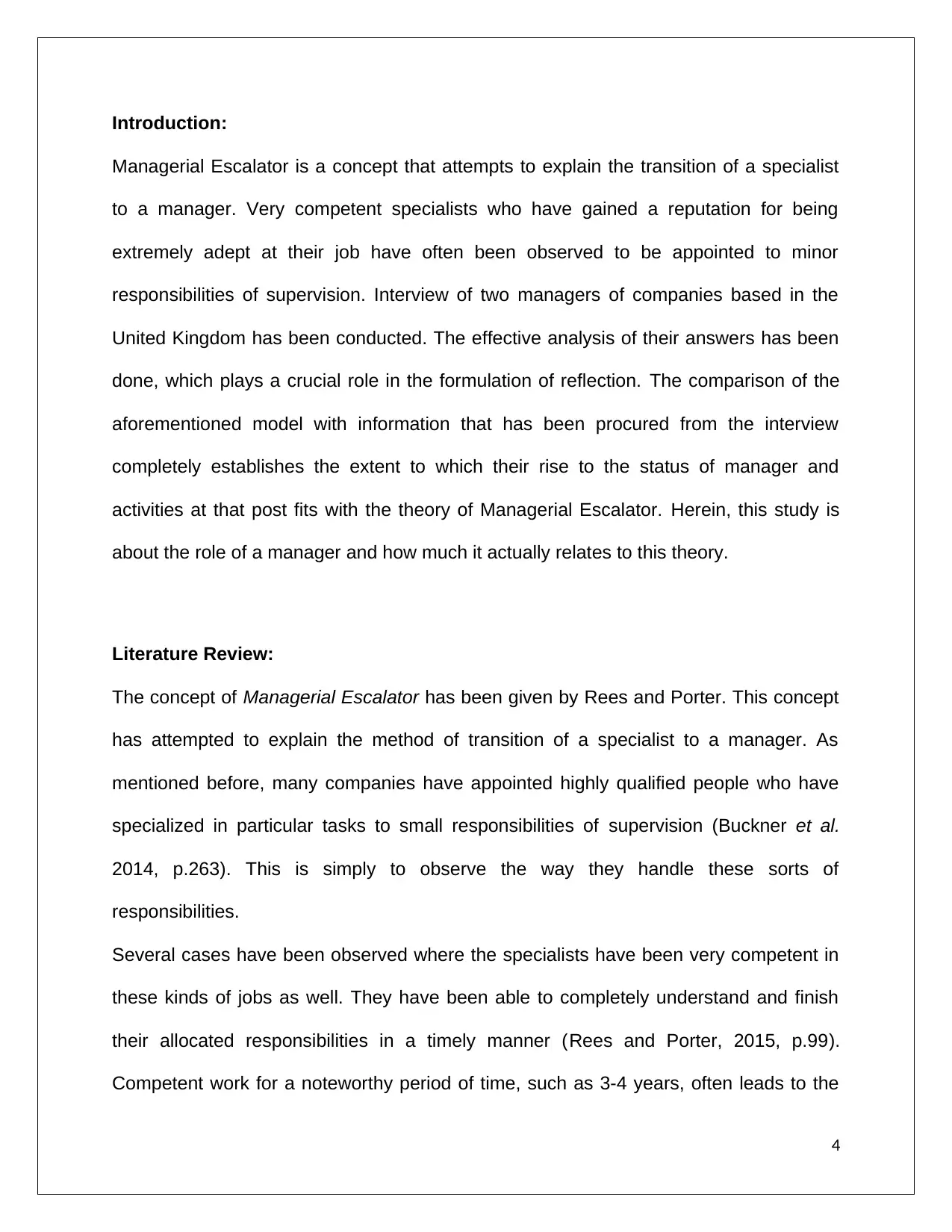
Introduction:
Managerial Escalator is a concept that attempts to explain the transition of a specialist
to a manager. Very competent specialists who have gained a reputation for being
extremely adept at their job have often been observed to be appointed to minor
responsibilities of supervision. Interview of two managers of companies based in the
United Kingdom has been conducted. The effective analysis of their answers has been
done, which plays a crucial role in the formulation of reflection. The comparison of the
aforementioned model with information that has been procured from the interview
completely establishes the extent to which their rise to the status of manager and
activities at that post fits with the theory of Managerial Escalator. Herein, this study is
about the role of a manager and how much it actually relates to this theory.
Literature Review:
The concept of Managerial Escalator has been given by Rees and Porter. This concept
has attempted to explain the method of transition of a specialist to a manager. As
mentioned before, many companies have appointed highly qualified people who have
specialized in particular tasks to small responsibilities of supervision (Buckner et al.
2014, p.263). This is simply to observe the way they handle these sorts of
responsibilities.
Several cases have been observed where the specialists have been very competent in
these kinds of jobs as well. They have been able to completely understand and finish
their allocated responsibilities in a timely manner (Rees and Porter, 2015, p.99).
Competent work for a noteworthy period of time, such as 3-4 years, often leads to the
4
Managerial Escalator is a concept that attempts to explain the transition of a specialist
to a manager. Very competent specialists who have gained a reputation for being
extremely adept at their job have often been observed to be appointed to minor
responsibilities of supervision. Interview of two managers of companies based in the
United Kingdom has been conducted. The effective analysis of their answers has been
done, which plays a crucial role in the formulation of reflection. The comparison of the
aforementioned model with information that has been procured from the interview
completely establishes the extent to which their rise to the status of manager and
activities at that post fits with the theory of Managerial Escalator. Herein, this study is
about the role of a manager and how much it actually relates to this theory.
Literature Review:
The concept of Managerial Escalator has been given by Rees and Porter. This concept
has attempted to explain the method of transition of a specialist to a manager. As
mentioned before, many companies have appointed highly qualified people who have
specialized in particular tasks to small responsibilities of supervision (Buckner et al.
2014, p.263). This is simply to observe the way they handle these sorts of
responsibilities.
Several cases have been observed where the specialists have been very competent in
these kinds of jobs as well. They have been able to completely understand and finish
their allocated responsibilities in a timely manner (Rees and Porter, 2015, p.99).
Competent work for a noteworthy period of time, such as 3-4 years, often leads to the
4
Paraphrase This Document
Need a fresh take? Get an instant paraphrase of this document with our AI Paraphraser
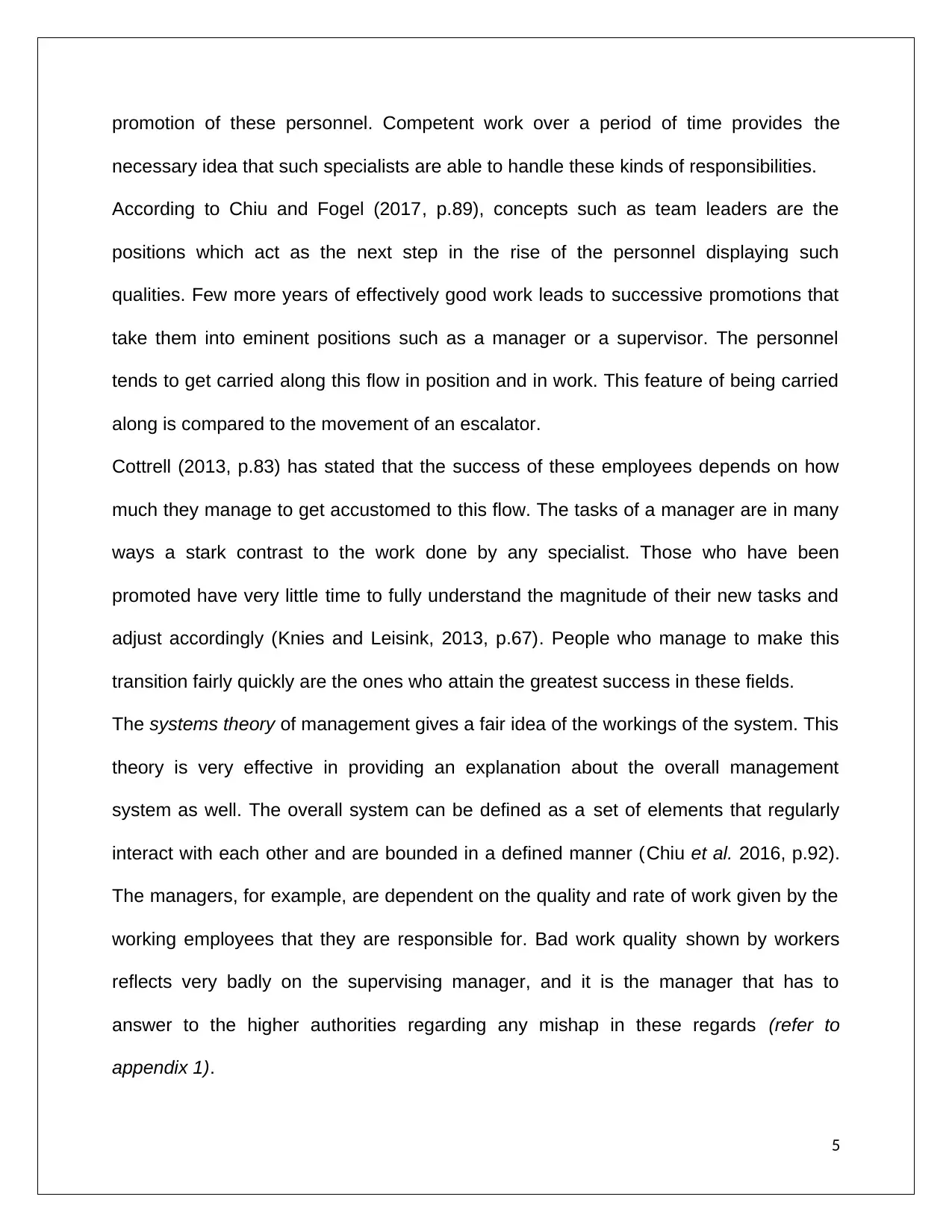
promotion of these personnel. Competent work over a period of time provides the
necessary idea that such specialists are able to handle these kinds of responsibilities.
According to Chiu and Fogel (2017, p.89), concepts such as team leaders are the
positions which act as the next step in the rise of the personnel displaying such
qualities. Few more years of effectively good work leads to successive promotions that
take them into eminent positions such as a manager or a supervisor. The personnel
tends to get carried along this flow in position and in work. This feature of being carried
along is compared to the movement of an escalator.
Cottrell (2013, p.83) has stated that the success of these employees depends on how
much they manage to get accustomed to this flow. The tasks of a manager are in many
ways a stark contrast to the work done by any specialist. Those who have been
promoted have very little time to fully understand the magnitude of their new tasks and
adjust accordingly (Knies and Leisink, 2013, p.67). People who manage to make this
transition fairly quickly are the ones who attain the greatest success in these fields.
The systems theory of management gives a fair idea of the workings of the system. This
theory is very effective in providing an explanation about the overall management
system as well. The overall system can be defined as a set of elements that regularly
interact with each other and are bounded in a defined manner (Chiu et al. 2016, p.92).
The managers, for example, are dependent on the quality and rate of work given by the
working employees that they are responsible for. Bad work quality shown by workers
reflects very badly on the supervising manager, and it is the manager that has to
answer to the higher authorities regarding any mishap in these regards (refer to
appendix 1).
5
necessary idea that such specialists are able to handle these kinds of responsibilities.
According to Chiu and Fogel (2017, p.89), concepts such as team leaders are the
positions which act as the next step in the rise of the personnel displaying such
qualities. Few more years of effectively good work leads to successive promotions that
take them into eminent positions such as a manager or a supervisor. The personnel
tends to get carried along this flow in position and in work. This feature of being carried
along is compared to the movement of an escalator.
Cottrell (2013, p.83) has stated that the success of these employees depends on how
much they manage to get accustomed to this flow. The tasks of a manager are in many
ways a stark contrast to the work done by any specialist. Those who have been
promoted have very little time to fully understand the magnitude of their new tasks and
adjust accordingly (Knies and Leisink, 2013, p.67). People who manage to make this
transition fairly quickly are the ones who attain the greatest success in these fields.
The systems theory of management gives a fair idea of the workings of the system. This
theory is very effective in providing an explanation about the overall management
system as well. The overall system can be defined as a set of elements that regularly
interact with each other and are bounded in a defined manner (Chiu et al. 2016, p.92).
The managers, for example, are dependent on the quality and rate of work given by the
working employees that they are responsible for. Bad work quality shown by workers
reflects very badly on the supervising manager, and it is the manager that has to
answer to the higher authorities regarding any mishap in these regards (refer to
appendix 1).
5
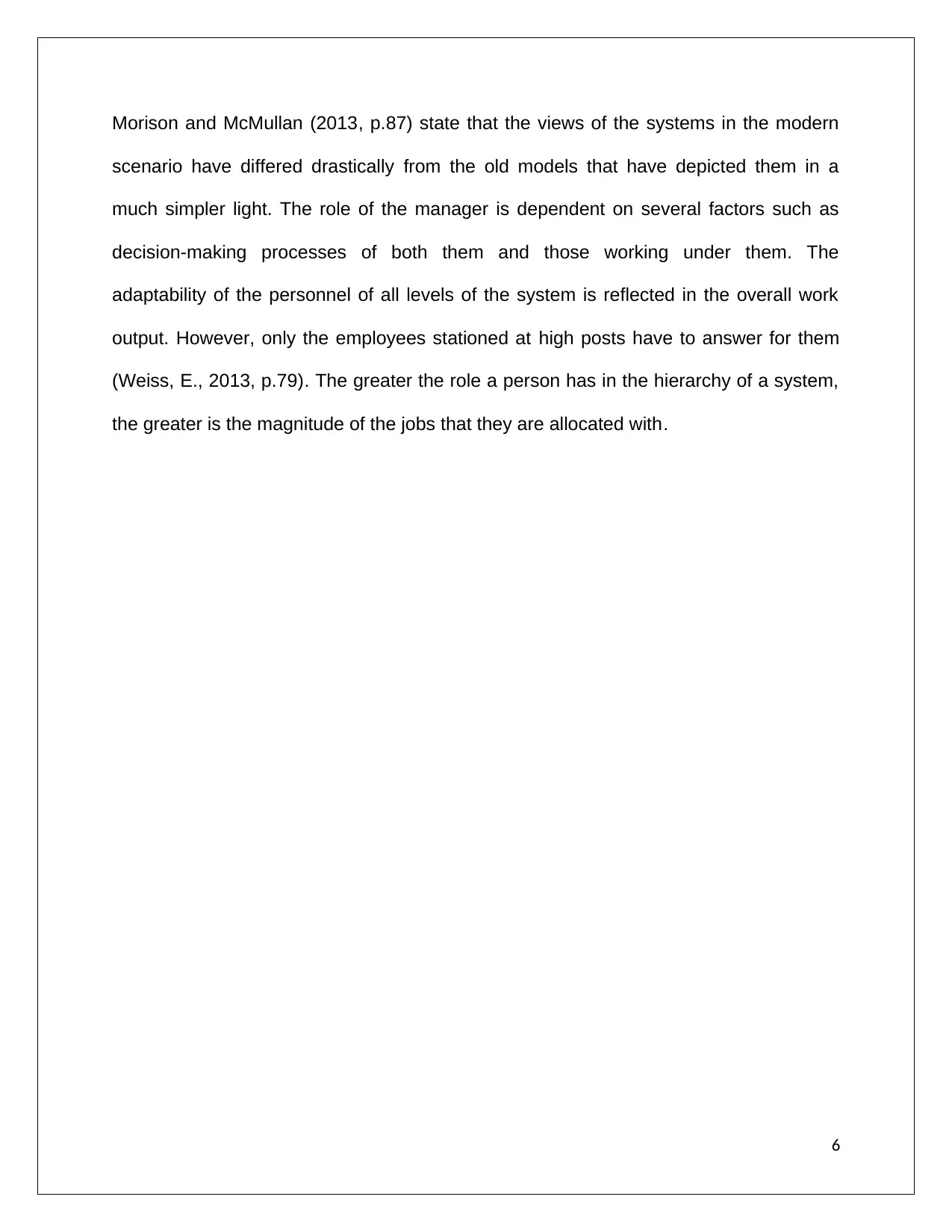
Morison and McMullan (2013, p.87) state that the views of the systems in the modern
scenario have differed drastically from the old models that have depicted them in a
much simpler light. The role of the manager is dependent on several factors such as
decision-making processes of both them and those working under them. The
adaptability of the personnel of all levels of the system is reflected in the overall work
output. However, only the employees stationed at high posts have to answer for them
(Weiss, E., 2013, p.79). The greater the role a person has in the hierarchy of a system,
the greater is the magnitude of the jobs that they are allocated with.
6
scenario have differed drastically from the old models that have depicted them in a
much simpler light. The role of the manager is dependent on several factors such as
decision-making processes of both them and those working under them. The
adaptability of the personnel of all levels of the system is reflected in the overall work
output. However, only the employees stationed at high posts have to answer for them
(Weiss, E., 2013, p.79). The greater the role a person has in the hierarchy of a system,
the greater is the magnitude of the jobs that they are allocated with.
6
⊘ This is a preview!⊘
Do you want full access?
Subscribe today to unlock all pages.

Trusted by 1+ million students worldwide
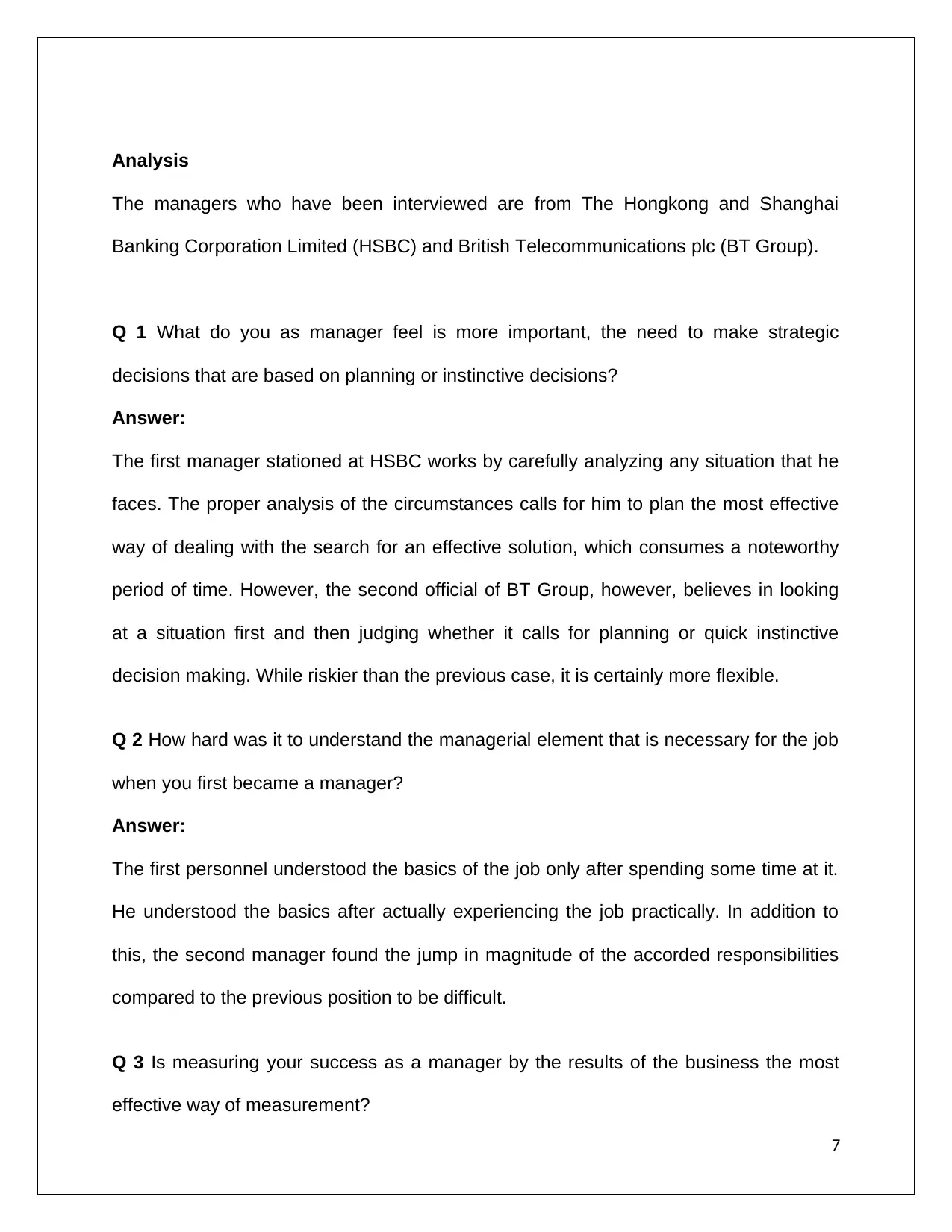
Analysis
The managers who have been interviewed are from The Hongkong and Shanghai
Banking Corporation Limited (HSBC) and British Telecommunications plc (BT Group).
Q 1 What do you as manager feel is more important, the need to make strategic
decisions that are based on planning or instinctive decisions?
Answer:
The first manager stationed at HSBC works by carefully analyzing any situation that he
faces. The proper analysis of the circumstances calls for him to plan the most effective
way of dealing with the search for an effective solution, which consumes a noteworthy
period of time. However, the second official of BT Group, however, believes in looking
at a situation first and then judging whether it calls for planning or quick instinctive
decision making. While riskier than the previous case, it is certainly more flexible.
Q 2 How hard was it to understand the managerial element that is necessary for the job
when you first became a manager?
Answer:
The first personnel understood the basics of the job only after spending some time at it.
He understood the basics after actually experiencing the job practically. In addition to
this, the second manager found the jump in magnitude of the accorded responsibilities
compared to the previous position to be difficult.
Q 3 Is measuring your success as a manager by the results of the business the most
effective way of measurement?
7
The managers who have been interviewed are from The Hongkong and Shanghai
Banking Corporation Limited (HSBC) and British Telecommunications plc (BT Group).
Q 1 What do you as manager feel is more important, the need to make strategic
decisions that are based on planning or instinctive decisions?
Answer:
The first manager stationed at HSBC works by carefully analyzing any situation that he
faces. The proper analysis of the circumstances calls for him to plan the most effective
way of dealing with the search for an effective solution, which consumes a noteworthy
period of time. However, the second official of BT Group, however, believes in looking
at a situation first and then judging whether it calls for planning or quick instinctive
decision making. While riskier than the previous case, it is certainly more flexible.
Q 2 How hard was it to understand the managerial element that is necessary for the job
when you first became a manager?
Answer:
The first personnel understood the basics of the job only after spending some time at it.
He understood the basics after actually experiencing the job practically. In addition to
this, the second manager found the jump in magnitude of the accorded responsibilities
compared to the previous position to be difficult.
Q 3 Is measuring your success as a manager by the results of the business the most
effective way of measurement?
7
Paraphrase This Document
Need a fresh take? Get an instant paraphrase of this document with our AI Paraphraser
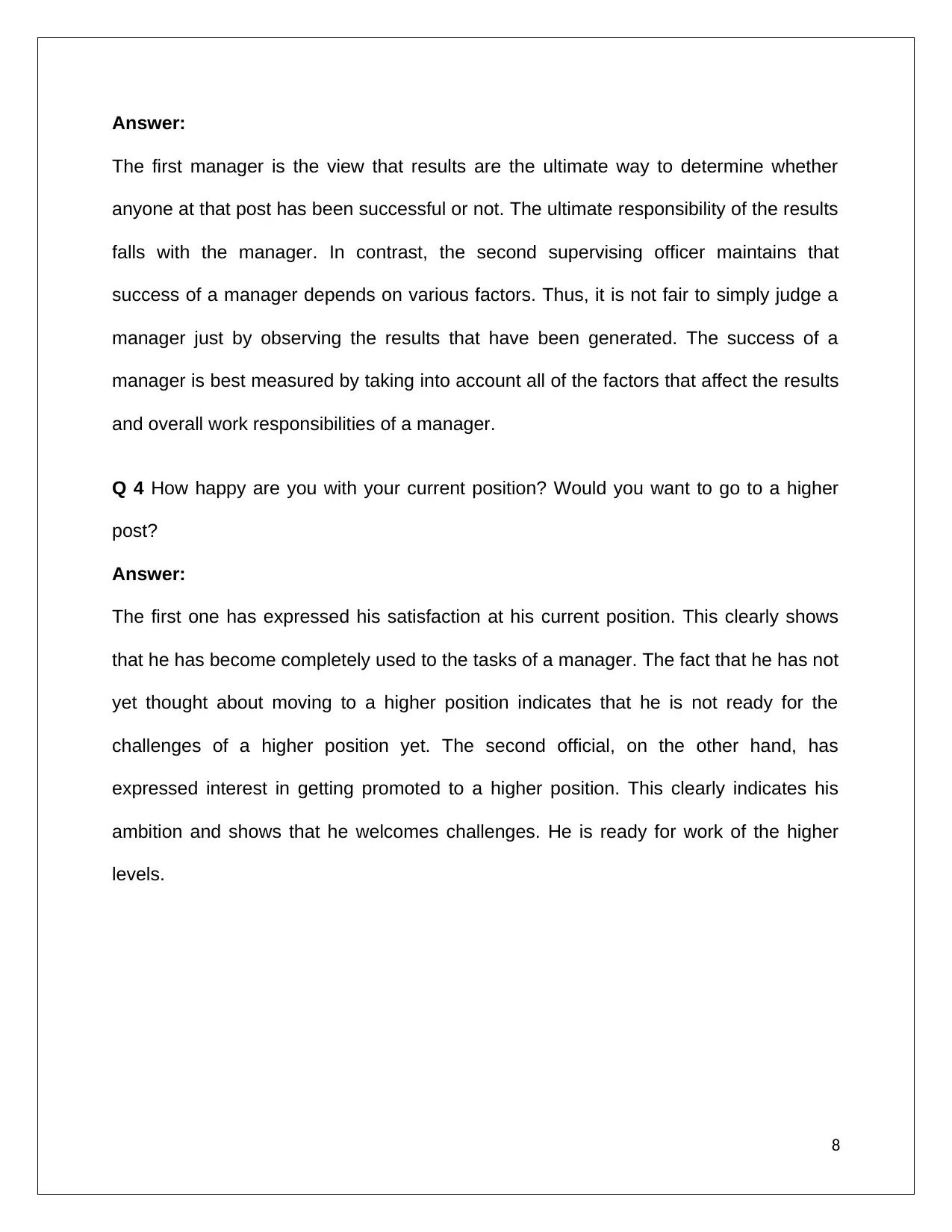
Answer:
The first manager is the view that results are the ultimate way to determine whether
anyone at that post has been successful or not. The ultimate responsibility of the results
falls with the manager. In contrast, the second supervising officer maintains that
success of a manager depends on various factors. Thus, it is not fair to simply judge a
manager just by observing the results that have been generated. The success of a
manager is best measured by taking into account all of the factors that affect the results
and overall work responsibilities of a manager.
Q 4 How happy are you with your current position? Would you want to go to a higher
post?
Answer:
The first one has expressed his satisfaction at his current position. This clearly shows
that he has become completely used to the tasks of a manager. The fact that he has not
yet thought about moving to a higher position indicates that he is not ready for the
challenges of a higher position yet. The second official, on the other hand, has
expressed interest in getting promoted to a higher position. This clearly indicates his
ambition and shows that he welcomes challenges. He is ready for work of the higher
levels.
8
The first manager is the view that results are the ultimate way to determine whether
anyone at that post has been successful or not. The ultimate responsibility of the results
falls with the manager. In contrast, the second supervising officer maintains that
success of a manager depends on various factors. Thus, it is not fair to simply judge a
manager just by observing the results that have been generated. The success of a
manager is best measured by taking into account all of the factors that affect the results
and overall work responsibilities of a manager.
Q 4 How happy are you with your current position? Would you want to go to a higher
post?
Answer:
The first one has expressed his satisfaction at his current position. This clearly shows
that he has become completely used to the tasks of a manager. The fact that he has not
yet thought about moving to a higher position indicates that he is not ready for the
challenges of a higher position yet. The second official, on the other hand, has
expressed interest in getting promoted to a higher position. This clearly indicates his
ambition and shows that he welcomes challenges. He is ready for work of the higher
levels.
8
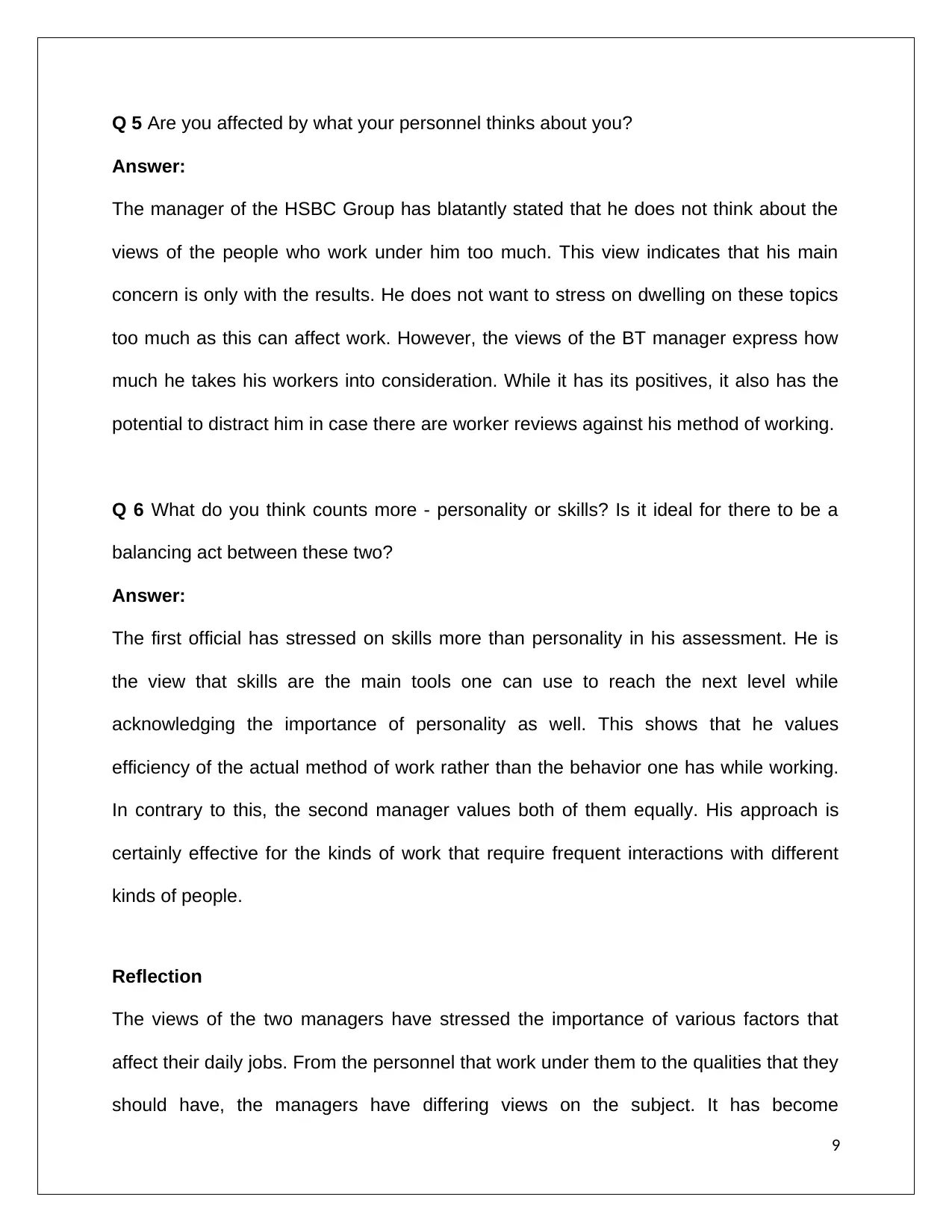
Q 5 Are you affected by what your personnel thinks about you?
Answer:
The manager of the HSBC Group has blatantly stated that he does not think about the
views of the people who work under him too much. This view indicates that his main
concern is only with the results. He does not want to stress on dwelling on these topics
too much as this can affect work. However, the views of the BT manager express how
much he takes his workers into consideration. While it has its positives, it also has the
potential to distract him in case there are worker reviews against his method of working.
Q 6 What do you think counts more - personality or skills? Is it ideal for there to be a
balancing act between these two?
Answer:
The first official has stressed on skills more than personality in his assessment. He is
the view that skills are the main tools one can use to reach the next level while
acknowledging the importance of personality as well. This shows that he values
efficiency of the actual method of work rather than the behavior one has while working.
In contrary to this, the second manager values both of them equally. His approach is
certainly effective for the kinds of work that require frequent interactions with different
kinds of people.
Reflection
The views of the two managers have stressed the importance of various factors that
affect their daily jobs. From the personnel that work under them to the qualities that they
should have, the managers have differing views on the subject. It has become
9
Answer:
The manager of the HSBC Group has blatantly stated that he does not think about the
views of the people who work under him too much. This view indicates that his main
concern is only with the results. He does not want to stress on dwelling on these topics
too much as this can affect work. However, the views of the BT manager express how
much he takes his workers into consideration. While it has its positives, it also has the
potential to distract him in case there are worker reviews against his method of working.
Q 6 What do you think counts more - personality or skills? Is it ideal for there to be a
balancing act between these two?
Answer:
The first official has stressed on skills more than personality in his assessment. He is
the view that skills are the main tools one can use to reach the next level while
acknowledging the importance of personality as well. This shows that he values
efficiency of the actual method of work rather than the behavior one has while working.
In contrary to this, the second manager values both of them equally. His approach is
certainly effective for the kinds of work that require frequent interactions with different
kinds of people.
Reflection
The views of the two managers have stressed the importance of various factors that
affect their daily jobs. From the personnel that work under them to the qualities that they
should have, the managers have differing views on the subject. It has become
9
⊘ This is a preview!⊘
Do you want full access?
Subscribe today to unlock all pages.

Trusted by 1+ million students worldwide
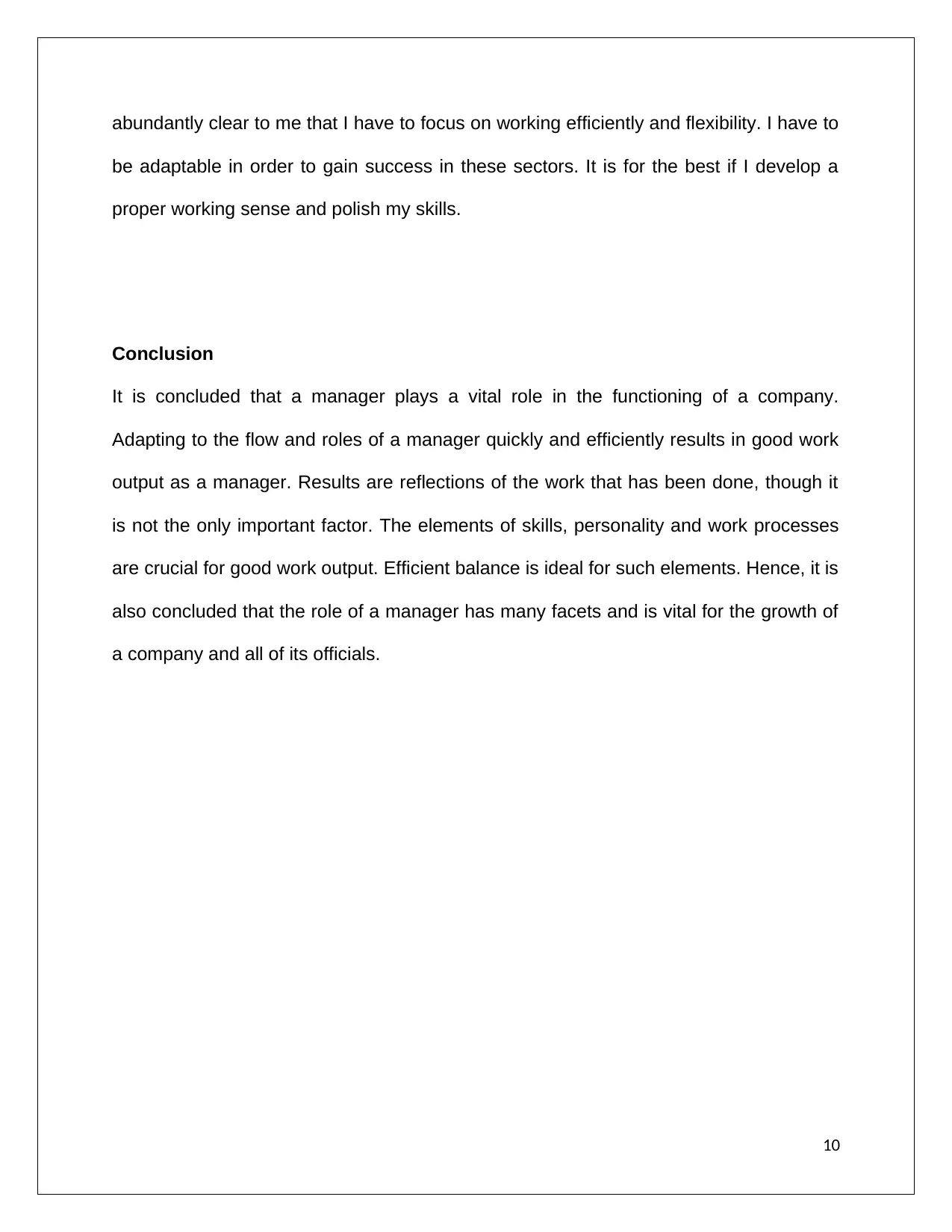
abundantly clear to me that I have to focus on working efficiently and flexibility. I have to
be adaptable in order to gain success in these sectors. It is for the best if I develop a
proper working sense and polish my skills.
Conclusion
It is concluded that a manager plays a vital role in the functioning of a company.
Adapting to the flow and roles of a manager quickly and efficiently results in good work
output as a manager. Results are reflections of the work that has been done, though it
is not the only important factor. The elements of skills, personality and work processes
are crucial for good work output. Efficient balance is ideal for such elements. Hence, it is
also concluded that the role of a manager has many facets and is vital for the growth of
a company and all of its officials.
10
be adaptable in order to gain success in these sectors. It is for the best if I develop a
proper working sense and polish my skills.
Conclusion
It is concluded that a manager plays a vital role in the functioning of a company.
Adapting to the flow and roles of a manager quickly and efficiently results in good work
output as a manager. Results are reflections of the work that has been done, though it
is not the only important factor. The elements of skills, personality and work processes
are crucial for good work output. Efficient balance is ideal for such elements. Hence, it is
also concluded that the role of a manager has many facets and is vital for the growth of
a company and all of its officials.
10
Paraphrase This Document
Need a fresh take? Get an instant paraphrase of this document with our AI Paraphraser
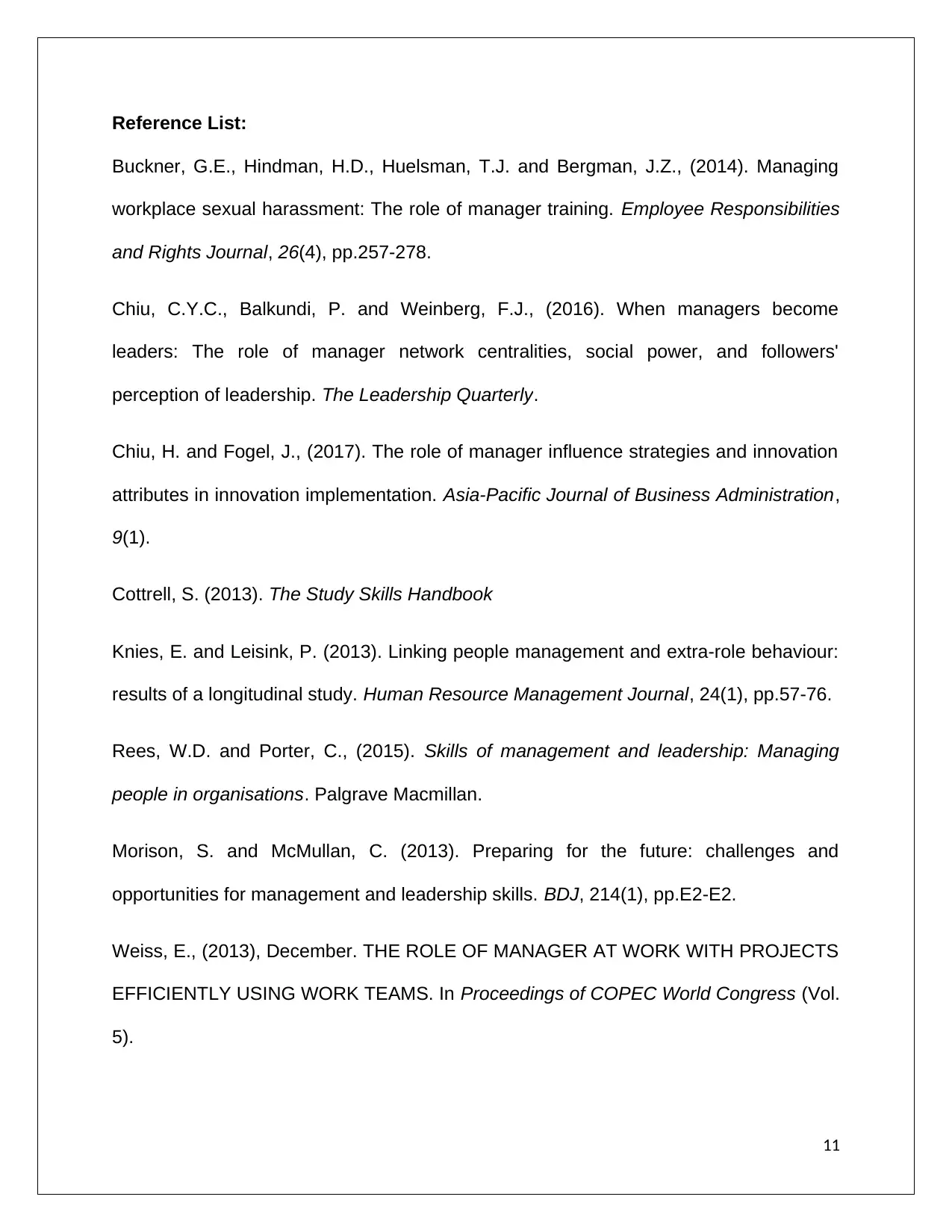
Reference List:
Buckner, G.E., Hindman, H.D., Huelsman, T.J. and Bergman, J.Z., (2014). Managing
workplace sexual harassment: The role of manager training. Employee Responsibilities
and Rights Journal, 26(4), pp.257-278.
Chiu, C.Y.C., Balkundi, P. and Weinberg, F.J., (2016). When managers become
leaders: The role of manager network centralities, social power, and followers'
perception of leadership. The Leadership Quarterly.
Chiu, H. and Fogel, J., (2017). The role of manager influence strategies and innovation
attributes in innovation implementation. Asia-Pacific Journal of Business Administration,
9(1).
Cottrell, S. (2013). The Study Skills Handbook
Knies, E. and Leisink, P. (2013). Linking people management and extra-role behaviour:
results of a longitudinal study. Human Resource Management Journal, 24(1), pp.57-76.
Rees, W.D. and Porter, C., (2015). Skills of management and leadership: Managing
people in organisations. Palgrave Macmillan.
Morison, S. and McMullan, C. (2013). Preparing for the future: challenges and
opportunities for management and leadership skills. BDJ, 214(1), pp.E2-E2.
Weiss, E., (2013), December. THE ROLE OF MANAGER AT WORK WITH PROJECTS
EFFICIENTLY USING WORK TEAMS. In Proceedings of COPEC World Congress (Vol.
5).
11
Buckner, G.E., Hindman, H.D., Huelsman, T.J. and Bergman, J.Z., (2014). Managing
workplace sexual harassment: The role of manager training. Employee Responsibilities
and Rights Journal, 26(4), pp.257-278.
Chiu, C.Y.C., Balkundi, P. and Weinberg, F.J., (2016). When managers become
leaders: The role of manager network centralities, social power, and followers'
perception of leadership. The Leadership Quarterly.
Chiu, H. and Fogel, J., (2017). The role of manager influence strategies and innovation
attributes in innovation implementation. Asia-Pacific Journal of Business Administration,
9(1).
Cottrell, S. (2013). The Study Skills Handbook
Knies, E. and Leisink, P. (2013). Linking people management and extra-role behaviour:
results of a longitudinal study. Human Resource Management Journal, 24(1), pp.57-76.
Rees, W.D. and Porter, C., (2015). Skills of management and leadership: Managing
people in organisations. Palgrave Macmillan.
Morison, S. and McMullan, C. (2013). Preparing for the future: challenges and
opportunities for management and leadership skills. BDJ, 214(1), pp.E2-E2.
Weiss, E., (2013), December. THE ROLE OF MANAGER AT WORK WITH PROJECTS
EFFICIENTLY USING WORK TEAMS. In Proceedings of COPEC World Congress (Vol.
5).
11
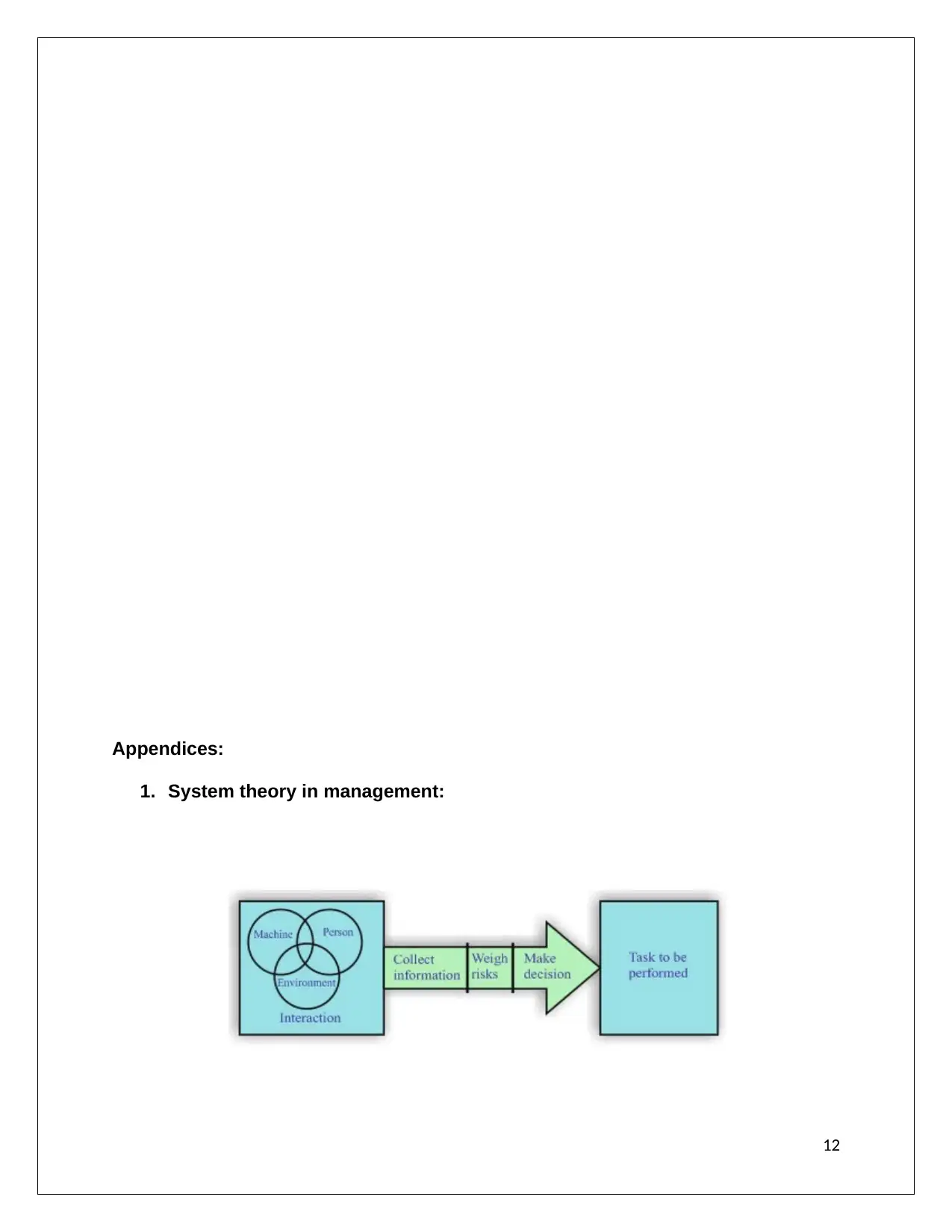
Appendices:
1. System theory in management:
12
1. System theory in management:
12
⊘ This is a preview!⊘
Do you want full access?
Subscribe today to unlock all pages.

Trusted by 1+ million students worldwide
1 out of 15
Related Documents
Your All-in-One AI-Powered Toolkit for Academic Success.
+13062052269
info@desklib.com
Available 24*7 on WhatsApp / Email
![[object Object]](/_next/static/media/star-bottom.7253800d.svg)
Unlock your academic potential
Copyright © 2020–2026 A2Z Services. All Rights Reserved. Developed and managed by ZUCOL.





